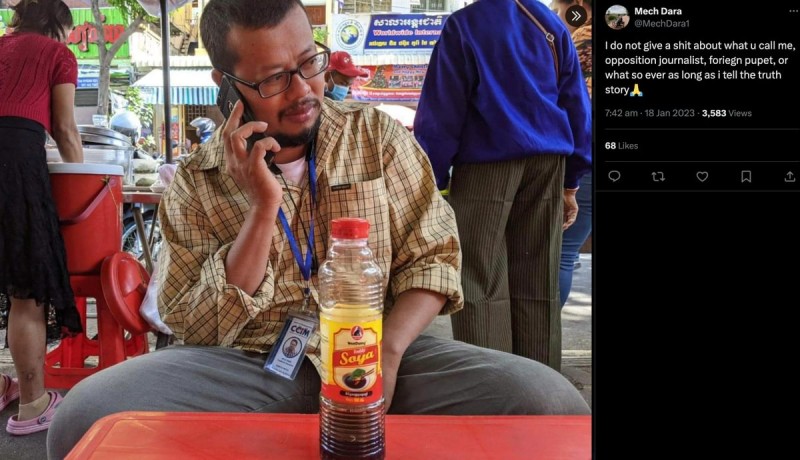In a Phnom Penh court, prosecutors cited several social media posts between September 20 and 29 as justification for the charge. The judge concurred and sent Dara to pre-trial detention, according to a court statement. Dara faces up to two years prison if found guilty.
“The use of incitement charges against Dara is a clear attempt to silence a brave journalist whose investigative journalism has routinely called for accountability in cases of human rights violations,” a statement by more than 40 Cambodian and Southeast Asian media and human rights groups released on Tuesday said.
“We urge the Cambodian government to immediately drop the charges against Mech Dara, release him from prison and stop all forms of harassment against media organizations and journalists,” the groups appealed.
“The arrest of Dara is a clear attempt to intimidate and silence him and other journalists in a country where press freedoms are routinely curtailed,” the statement added.
Dara, who has prominently reported on human trafficking and cyber fraud activity, was detained on Monday at an expressway toll in Cambodia’s Koh Kong province, while he was traveling with his family. A family member said that police were acting on an arrest warrant.
During his arrest, Dara managed to message local rights group Licadho “I was arrested and sent to military province police (sic),” before his phone was taken away, according to a post by the Cambodian Journalists Alliance Association (CamboJA).
Dara’s investigative works have exposed how Cambodian organized crime groups have kidnapped and forcibly confined victims in compounds, where they are then forced to target others around the world in online scam operations.
The journalist had previously reported on the links to scam factories of Ly Yong Phat, a Cambodian senator and tycoon who was sanctioned last month by the U.S. Treasury for “serious human rights abuse” and human trafficking.
The U.S. State Department honored Dara in 2023 for bringing international attention to the problem and for promoting improvements in the Cambodian government’s anti-trafficking response.
When asked about his arrest, a U.S. State Department spokesperson told OCCRP that “we are aware of public reports and are following developments closely with great concern.”
The day before his arrest, Dara posted now-deleted photos of a quarry operation that was allegedly responsible for the destruction of a stairway leading to a pagoda in the Prey Veng province. A provincial administration later accused Dara of “wanting to cause social disorder or confusion” and called on the Ministry of Information to take legal action against him.
In other posts between September 20 and 29, Dara criticized the government’s handling of police bribery cases and a decision of a local court to give a five year prison sentence to a drunk driver who killed four people.
Dara was previously detained by authorities in 2022 for his coverage on the rescue of Vietnamese nationals from an alleged scam compound, CamboJA said.
Cambodia currently sits in the lower strata of Reporters Without Borders Press Freedom Index. Media outlets are expected to report in line with the government’s narrative, while subjects such as political opposition and corruption are deemed “impossible to cover,” according to the Paris-based NGO.
“There is NO SCENARIO in which this is not a politically motivated arrest,” J Daniel Sims, a visiting expert on transnational crime with the United States Institute of Peace, posted on X. Sims went on to describe Dara as “a leading voice shedding light on state-affiliated criminal industries for years amidst mounting repression.”






